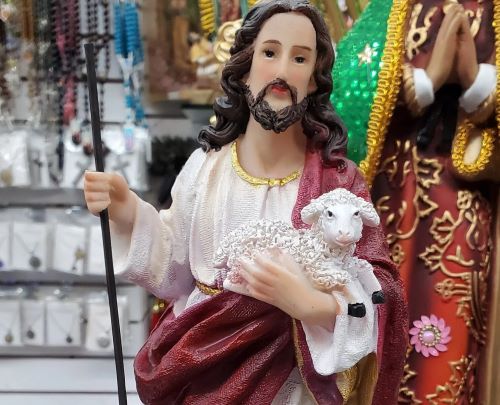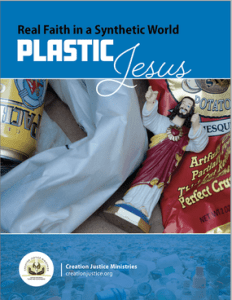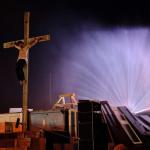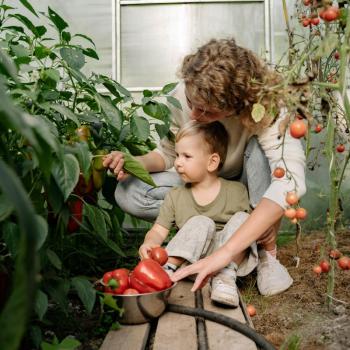Plastic Jesus is everywhere, just like plastic itself. For Earth Day, churches can call for a plastic-free future.

Here are ideas for preaching about the theme of Planet vs. Plastics for Earth Day, 2024. This is based on John 10:11-18, the assigned Gospel reading for April 21, Good Shepherd Sunday. This is part of the EcoPreacher 1-2-3 series to equip preachers and congregations for engaging the Bible through an ecological lens.
Eco-Exegesis
Eco-exegesis is a method of interpreting the biblical text through a green lens using the principles of ecological theology. Learn more here.
The theme for Earth Day 2024 is “Planet vs. Plastic.” According to a press release from EarthDay.org, the campaign “unites students, parents, businesses, governments, churches, unions, individuals, and NGOs in an unwavering commitment to call for the end of plastics for the sake of human and planetary health, demanding a 60% reduction in the production of plastics by 2040 and an ultimate goal of building a plastic-free future for generations to come.”
Did you know that plastic was invented in 1909?
Despite the marvel of human ingenuity that has found helpful uses for plastic in construction, medical instruments, and safety, the fact is that the world produces more than 450 million tons of plastic each year. We are, in fact, flooded with plastic that is threatening life on this planet.
Plastic production results in chemical pollution in communities of color as well as poor White communities. Plastic waste remains for hundreds of years and can be found in the most remote forests as well as the deepest ocean trenches. And microplastics are now found in our very bodies. Plastics have become the Pandora’s Box of environmental problems.
Because of their toxicity and ubiquity, plastics result in the opposite of what God intended for Creation.
Consider Genesis 1:20-23:
And God said, ‘Let the waters bring forth swarms of living creatures, and let birds fly above the earth across the dome of the sky.’ So God created the great sea monsters and every living creature that moves, of every kind, with which the waters swarm, and every winged bird of every kind. And God saw that it was good. God blessed them, saying, ‘Be fruitful and multiply and fill the waters in the seas, and let birds multiply on the earth.’
Today, none of the creatures of the land or sea are safe from plastic pollution. As Eco Bible, Vol. 1 notes: “Much of this plastic breaks down into tinier pieces, which are then eaten by fish and make their way into both the wild and human food chain. So in a sense, we are experiencing a flood of plastics that threatens to blot out sea life [just as the flood did in Genesis 7] . . . We must transform our planet into an Ark to preserve God’s creation,” (23-24).
What is the church’s role in helping the world meet the goal of reducing plastics and building a plastic-free future?
The passage from John 10:11-18 offers helpful biblical and theological framing for this work.
Jesus said: ‘I am the good shepherd. The good shepherd lays down his life for the sheep.’ John 10:11
Jesus the Good Shepherd
Jesus describes himself as a “the good shepherd” who will do anything to protect those in his care. He contrasts his devotion to the sheep with those who are only hired hands.
Earlier in the passage, he calls out “thieves and bandits.” In either case, they have no relationship with the sheep and see only them only as a commodity for their own enrichment. In the same way, the fossil fuel and plastics industry have enriched themselves while sacrificing the health and well-being of people, animals, fish, birds, and ecosystems.

Plastic Jesus: Real Faith in a Synthetic World
Creation Justice Ministries has developed a comprehensive resource called Plastic Jesus: Real Faith in a Synthetic World. This free, downloadable resource offers theological framing, sermon starters, prayer and worship resources, stories of people of faith taking action, and actions congregations can take to address the plastics crisis.
At the very least, we must follow and reiterate the command not to make graven images of God (Exodus 20:4). This is exactly what we see in Plastic Jesus.
Plastic Jesus = Idolatry
Recall that in Exodus 32:1-6, it was the image of the golden calf made with human hands that brought on the consequences of idolatry. The people were made to drink the ground-up gold and endure a plague. In much the same way, we are ingesting the idolatrous works of our hands – microplastics that are in our food, air, and water. Now we are enduring the plague of health and environmental problems. We’re seeing the toxification, starvation, and suffocation of wildlife. And plastic pollution for humans results in hormonal changes, developmental disorders, reproductive abnormalities, and cancer.
Fortunately, there are individuals, communities, and congregations who are leading the fight against plastic pollution. A sermon could highlight these stories and inspire the congregation to contribute to the movement of a plastic-free future as part of their vocation of caring for God’s Creation.
1 Eco-Idea
The Eco-Idea is one succinct statement that tells us who God is and/or what God does in relation to Creation and how we should respond as people of faith.
Just as Jesus the Good Shepherd laid down his life for those most vulnerable, the church must engage in education, advocacy, and actions against the plastics crisis that is harming people and the planet.
2 Eco-Questions
Eco-Questions are what we can ask to help a congregation draw out the implications of the Eco-Exegesis and Eco-Idea.
1 – How much plastic does your church produce in a month?
Form a team to pull out all plastic items that are thrown away in your building for 30 days. Then bring those bags of plastic trash into the sanctuary to illustrate just how much congregations unwittingly contribute to the plastics crisis.
2 – Where do you see the most plastic pollution in your community?
Challenge your congregation to do a “plastic scavenger hunt” and collect photos of where they see things like plastic bags in trees, plastic trash in waterways, and plastics in their workplaces.
3 Eco-Actions
Eco-Actions are ways that a congregation might respond to the Eco-Idea and Eco-Questions. One of these possibilities may have salience for your ministry context.
- Join the Plastic Jesus campaign! Invite your congregation to bring all of their plastic religious figurines as a symbol of their pledge to refrain from purchasing graven images.
- Urge Congress to Pass the REDUCE Act. This legislation would put a fee on the sale of new, virgin plastic resin used to make single-use products. Beginning a wave of positive change, the passage of the REDUCE act would bring less pollution to God’s Creation. To send a message to your elected representatives, click here.
- Plan a community clean-up event. Form a team in your congregation to help remove plastic trash in your community. Visit this website to plan a successful clean-up event.
Want to learn more about how to preach well in a climate-changed world?
Register for this FREE webinar that I’ll be moderating with Lexington Theological Seminary on April 23, 2024: Preaching in a Climate-Changed World: Engaging Climate Science, the Bible, and Theology
Looking for ongoing support, resources, and colleagues as you preach about environmental issues?
The new EcoPreacher Cohort begins in September 2024! This is a monthly online gathering of preachers for learning and companionship to preach effectively in a climate-changed world. A joint project of The BTS Center, Creation Justice Ministries, and Lexington Theological Seminary. To learn more click here.
Read also:
Six Children’s Sermon Ideas for Earth Day
10 Tips for Keeping Your Earth Day Resolutions
ONE HOME ONE FUTURE Campaign Launching for Congregations, Creation & Climate
EcoPreacher 1-2-3 is a partnership between the Rev. Dr. Leah Schade and the Interfaith Center for Sustainable Development, publishers of Eco Bible, a Jewish ecological commentary on the Hebrew Scriptures. EcoPreacher 1-2-3 provides Creation-centered sermon preparation that is short, accessible, and based on a solid biblical foundation. To see other EcoPreacher ideas and to sign up to receive future EcoPreacher 1-2-3 installments, click here.

The Rev. Dr. Leah D. Schade is the Associate Professor of Preaching and Worship at Lexington Theological Seminary in Kentucky and ordained in the ELCA. Dr. Schade does not speak for LTS or the ELCA; her opinions are her own. She is the author of Preaching in the Purple Zone: Ministry in the Red-Blue Divide (Rowman & Littlefield, 2019) and Creation-Crisis Preaching: Ecology, Theology, and the Pulpit (Chalice Press, 2015). She is the co-editor of Rooted and Rising: Voices of Courage in a Time of Climate Crisis (Rowman & Littlefield, 2019). Her newest book is Introduction to Preaching: Scripture, Theology, and Sermon Preparation, co-authored with Jerry L. Sumney and Emily Askew (Rowman & Littlefield, 2023).













